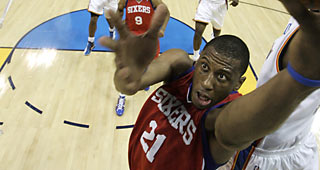The Sixers signed Thaddeus Young to a five-year, $42 million contract at the very start of the 2011 free agency period on Thursday.
Young is coming off his fourth NBA season and is still just 23-years-old after spending one season at Georgia Tech.
Young has emerged over the past two seasons as one of the game’s better bench scorers, averaging 17.6 points per 36 minutes on a True Shooting Percentage of 56.6% last season. During the second half of Doug Collins’ first season as head coach of the Sixers, Young’s usage rate went up to the mid 20s as his role and value to the team expanded. Collins clearly fell in love with Young and how this large financial commitment impacts the future of Andre Iguodala and Evan Turner will be seen over time. Iguodala has been on the block for basically his whole career and that won’t change now.
Young is an excellent scorer in transition and in the paint, but is still a modest jump-shooter. Whether or not he takes the next step to become a lead scorer instead of an off the bench scorer is based almost entirely on how he improves in this area.
On the defensive end of the floor, Philadelphia was 3.3 points per 100 possessions better with Young, but he also was playing a good portion of his minutes against second units. He can guard both forward positions, but not at a particularly high level. Young also is not a particularly good rebounder, though he put up better numbers this past season. His rebound rate hit 11.7% in 10-11, up from 9.5% in 09-10. Those numbers are good for a small forward, but not if he’s expected to rebound like a power forward. With Young as the primary power forward, he would need an elite rebounder and defender beside him at center to offset his weaknesses. The Sixers do have good rebounders in the backcourt with the likes of Jrue Holiday, but that is hardly the formula for efficiency over the long run.
The money is unquestionably significant for a non-star, but it is basically the same amount annually as what the Clippers agreed to with an older, less effective, injury-prone Caron Butler.
Going into the process, the Sixers wanted to keep Young without going too crazy with the price. By threatening to match any ‘reasonable’ offer, Rod Thorn kept his annual price well below that $10 million mark where it would become untenable. If Young plateaus as what he was last season, it is a high salary but one that the Sixers can live with.
Grade for Sixers: B
Young’s five-year guarantee is an excellent contract for his age and caliber of play. His $42 million deal beats Mike Conley, who received a $40 million deal last offseason and was the fourth overall pick in that 2007 draft class.
While he could have possibly squeezed another half million per year by waiting a little longer, Young did well to get it done at a lucrative number that doesn’t instant make him the type of player Philadelphia is eager to trade.
Grade for Young: A-



